
JULY 2006
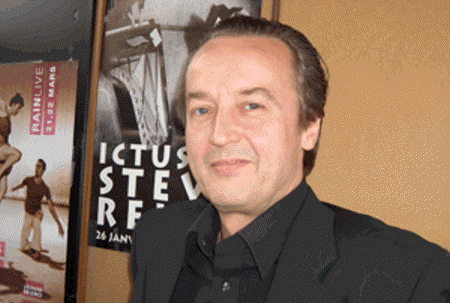
Music on wheels
By Noam Ben Ze'ev, Ha'aretz
The Balata refugee camp near Nablus is not known for its
cultural life. Yet, despite the poverty and ruin there -
thousands of families survive on food stipends and
hundreds live in shacks - residents of the camp find
solutions to their hunger for culture and art. There are
programs in community centers for women and youth and in
schools to meet this need. Now, a new program has been
added to the curriculum: music education, including
instruction in musical instruments.
This week 11 children from the camp, ages 7-13, are
visiting the French city of Lille. During the 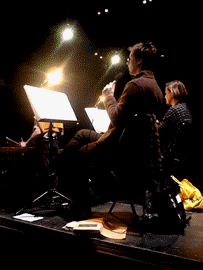 first days of their visit, they received
intensive musical training from Ictus, a contemporary
music ensemble, and today they will appear in a festive
concert in the city's opera house. The concert will be
the culmination of an extraordinary effort to collect
instruments for Palestinian and Israeli children. Ictus
leader Lukas Pairon, who founded the complex project, may
now gaze in satisfaction at the realization of his dream
- a dream many of his friends considered absolutely
unrealistic.
first days of their visit, they received
intensive musical training from Ictus, a contemporary
music ensemble, and today they will appear in a festive
concert in the city's opera house. The concert will be
the culmination of an extraordinary effort to collect
instruments for Palestinian and Israeli children. Ictus
leader Lukas Pairon, who founded the complex project, may
now gaze in satisfaction at the realization of his dream
- a dream many of his friends considered absolutely
unrealistic.
Two or three times a year, for more than three years,
Pairon has been coming to Israel with members of his
ensemble to work with Tel Aviv University students and
children from Nazareth and major cities in the West Bank.
Their determination to stay with friends rather than in
hotels made Israel and the territories their second home.
Refusing to settle for one-off expressions of
identification, they devote themselves to continuous
field work, which produces intimate ties with local
musicians.
"We are neither peace-minded politicians nor
promoters of an ideology of coexistence," Pairon
says. "We are working within the context of
independence on both sides. Thus, when peace comes, we
will be at a better starting point than others."
On one of their visits, Pairon came up with the idea of
collecting instruments. "I mentioned, during a
Belgian radio interview, that Palestinian children lack
instruments and asked for donations. Within a short time
I received dozens of instruments at my private
address," he says. "That encouraged me to found
a special non-profit organization devoted to this."
Leading Belgian musicians supported Pairon's Music Fund,
and the first collection campaign yielded hundreds of
instruments. "Donating an instrument is unlike any
other donation: It is highly personal and very
emotional," Pairon says. "There is a story
behind every instrument. The donor imagines the child who
will play the instrument, and thus people take an
imaginary trip from Belgium to Palestine and Israel to
bond with the children."
Pairon decided to escort personally the instruments to
their destination. He learned to drive a truck and
embarked last winter: He crossed the frigid European
continent, hopped on a ferry from Italy to Greece, sailed
all the way down to Piraeus, and from there boarded a
ship that docked in Haifa in January.
People watched the enormous truck emblazoned with the
message "Give Music a Chance" traveling the
length and breadth of the nation to unload its bounty:
flutes, clarinets, percussion instruments, string
instruments of all sizes, five pianos and guitars. All
were handed to outstretched hands to the resounding
echoes of the truck's message.
"I was afraid of what I would find here after Hamas
rose to power and elections were held in the territories
and Israel, but I do not believe our projects are in any
danger," Pairon says, on his latest visit to Israel.
In addition to musicians from his ensemble, two experts
in instrument repair joined him to conduct workshops in
the territories, "so that a league of instrument
builders and restorers will evolve there independent of
Europe," Pairon explains. Pairon also inspected the
level of music education during this visit - particularly
in the Balata refugee camp, where four music teachers
arrived from Lille.
The mood in Nablus has deteriorated following arrests and
funerals. Won't your musicians be affected by that?
"To tell you the truth, yes," Pairon admits.
"They are worried, depressed and irritable. We want
to work at a high musical level, and under current
conditions I can't blame them if they fall apart."
A visit to the Nablus casbah with Pairon reveals a
determined, fearless man disturbed only by the posters of
martyrs in every corner of the city. "I decided to
express my shock in response to this, and repeated over
and over that the immortalization of these suicide
bombers makes me sick," he says. "I was happy
to discover, among the Palestinians, wonderful people who
also oppose this and support only non-violent
protest."
On the way back to the Green Line we pass through
Ramallah, where Pairon's colleagues repair instruments
with pupils at the Al-Kamandjati School of Music. Back in
Nazareth, Pairon is thrilled by progress made there by
students at the Al-Mutran School since he and the
ensemble began teaching.
Why don't you introduce them to students in Nablus,
Ramallah and Bethlehem?
"We intended to do exactly that," Pairon sighs.
"The plan was to have Arab-Israeli pupils join the
current trip to France so that both sides could meet for
the first time. But the school canceled at the last
minute."
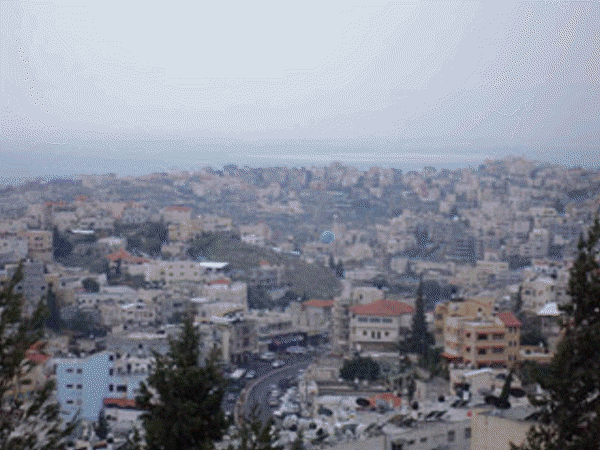
Making Gaza history
A year ago, a few months before the instruments arrived,
Pairon first visited Gaza to prepare for his project. His
hosts' requests appeared reasonable, in European terms:
Meet with everyone involved in music education in the
Gaza Strip in order to distribute the instruments best.
It sounds simple - but given Gaza's harsh socioeconomic
situation, it is extraordinarily difficult to promote
music education. Pairon stood firm and for the first time
in the costal strip's history, musical figures from all
four corners of Gaza assembled to discuss music.
"We need much more than musical instruments: We need
teachers to instill the population with a sense of the
significance of music," one of the participants
said. "Give us [fishing] rods - not fish. If you
want to help, bring us people to teach us how to
teach."
Controversy surrounded the issue of who would take
responsibility for the project in Gaza, and one of the
teachers suggested the Ministry of Education, in line
with a Western conservatory model. Pairon opposed the
idea and presented the example of Belgium, a nation that
permits bureaucracy and clerks to interfere with music
despite their lack of understanding, he says.
"We established an association of musicians first,
and only later turned to the government," he says,
making it clear that the Music Fund would only provide
instruments to institutions where it had direct
supervision. Finally, they decided to house the
instruments in two main institutions: The Al-Qattan
cultural center and the Gaza Broadcasting Service, which
sponsors an orchestra and a choir.
The musical instruments arrived a few months later.
Pairon was not permitted to enter Gaza with the Give
Music a Chance truck, and the instruments were unloaded
and packed into vehicles at the Karni crossing. At their
destinations, the vehicles were greeted with tears of
excitement: Guitars were pulled from cases, wind
instruments were polished, and the piano was rolled to a
place of honor on the auditorium stage of the Al-Qattan
Center for the Child - a cultural center that serves a
fifth of the 750,000 children in the Gaza Strip under the
age of 15. The center provides them with books,
audiovisual and reading rooms, an extensive garden, a
theater and musical performances. The Gaza Broadcasting
Service's own Arabic orchestra, accompanied by eight male
and female singers, welcomed the instruments in a moving
concert in a densely packed room, where classic Arabic
music rang in a professional, stirring, emotive
performance.
Despite deteriorating conditions in Gaza, Pairon does not
surrender: While Gaza does not appear on his current
itinerary he continues collecting instruments in Europe
at an avid clip, and he will return in December to
distribute them. "We will not give up on Gaza,"
he says. "There is still a lot of work there."
Meanwhile, he continues to meeting with the mayor of
Ramallah, local Belgian Embassy officials and Israel
Embassy officials in Brussels, among others. All of them,
except Israeli security figures, go out of their way to
help him and the diplomatic and institutional front he
has established here appears steadfast.
As someone who works on both sides, aren't you disturbed
that the instruments are mainly given to Palestinians?
There are certainly needy Jewish Israeli children who
lack them.
"I do not oppose also giving to Jews. Our job is to
help musicians and if there are those in Israel who make
a request [for instruments], we will certainly provide.
The instruments are intended for anyone who needs them.
MUSIC FUND, soloists from ICTUS
and four young music teachers
in Israel and Palestine from 1 to 9 january 2006
Coming to Nazareth is like coming home
for me. It is really as a second home for me to be with
Maha and Duaibis Abboud Ashkar, the parents of the
pianist Saleem Abboud Ashkar.
Saleem was our special guest at the final concert at the
National Opera of Brussels at the end of the first big
collecting campaign of Music Fund last April. He is a
young Arab-Israeli pianist now living in Berlin and
making a career thanks to invitations to perform as
soloist with conductors Daniel Barenboim, Zubin Mehta,
a.o., and this coming Summer with Riccardo Mutti and the
Wiener Philharmoniker.
For this reason, Saleem is also an example to many young
Arab-Israeli and Palestinian musicians dreaming of a
career as a professional musician in the field of
classical western music.
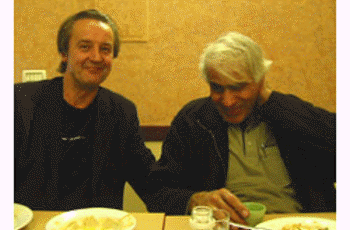
Lukas Pairon and Duaibis Abboud Ashkar (Orpheus)
© Pol De Winter His father Duaibis decided
seven years ago to accept a pre-retirement from his job
as an engineer for an Israeli communication company, and
started to work for one of the larger schools in
Nazareth, the El Mutran school of father Shoufani, in
order to start up a project around music education. He
wanted that other children would profit from the
experience he had had as parent of two kids wanting to
become musicians - besides Saleem, also his younger son
Nabeel is becoming a musician, a young and talented
violin player - by helping to set up music educational
schemes for children and youngsters from the Nazareth
area.
When Ictus started to come to Nazareth three years ago,
Duaibis and his organisation Orpheus had only just begun
with their music lessons in the El Mutran School and the
children were only in the very beginning of discovering
and learning music. What he succeeded to get to as
results in those few years is a real miracle.
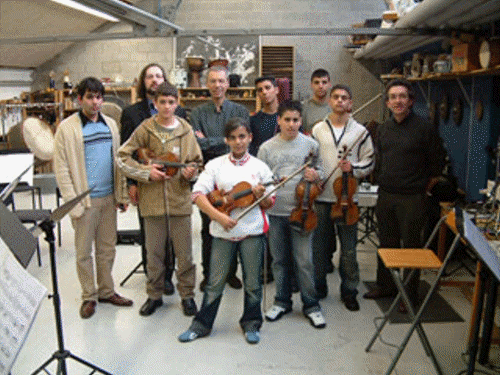
Students from Nazareth in Ictus rehearsal studio
(Brussels, April 2005)
together with (from left to right) teachers Nabeel
Abboud, Stéphane Ginsburgh,
Georges-Elie Octors and François Deppe
© Kimiko Nishi
The El Mutran school music department now
has about seventy pupils, beautiful facilities thanks to
the support of the director of the school, father
Shoufani, and good teachers from the jewish communities
around Nazareth thanks to the help of Uri Ben-David of
the kibbutz of Mizra, a.o. Orpheus has recently also
started similar programmes in five other schools of the
region. (see : www.orpheus-music-edu.org)
It has over the years been a growing pleasure for the
musicians of Ictus to come and teach these amazingly
promissing, talented and hardworking young students.
What we experienced today has been as a
culmination of all these experiences of the last years
though.
This week is a very special week for music education in
Nazareth : it is the beginning of a music workshop -
leading to a concert on 12th January - for chamber
orchestra and chamber music ensembles, which is being
organised for the first time by the Barenboim-Said
Foundation (see : www.barenboim-said.org), in
collaboration with Orpheus and also including the
participation of Ictus from 4 to 7 January.
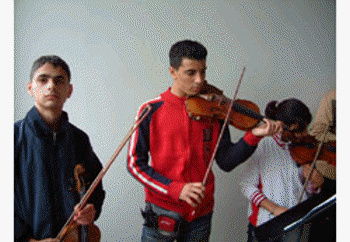
Students El Mutran School, Nazareth
© Lukas PaironThis workshop of one week brings
together 35 young music students, 9 coming from Nazareth
and the others from the West Bank (3 from Bethlehem, 4
from East-Jerusalem and 19 from Ramallah). It is an
initiative which is unique in many respects. The teachers
in this workshop are of high standard and are being sent
by the Barenboim-Said Foundation (Berlin, Sevilla,
Ramallah, Nablus, Nazareth), Al Kamandjati
(Ramallah ; www.alkamandjati.com),
Orpheus (Nazareth) and Ictus (Brussels ; www.ictus.be).
The synergy of these different organisations into this
one workshop creates a very strong platform, which I hope
will be able to endure. It is a.o. so very positive that
the kids from the West Bank get the possibility to travel
to Nazareth in Israel. Projects between Jewish Israelis
and Palestinians in the territories are physically not
possible, mostly not wanted and not happening, except
sometimes far away from this region in Europe or in the
US. A limited amount of very interesting projects between
Jewish and Arab Israelis - such as the ones in the
kibbutz of Mizra - do exist and are possible in Israel.
A project like this one bringing together Arab Israeli
kids from Nazareth and Palestinian kids from the West
Bank is complicated but possible and will hopefully be
even more developed in the future. Orpheus and his
founder Duaibis Abboud Ashkar can be proud to be the host
of such a wonderful initiative.
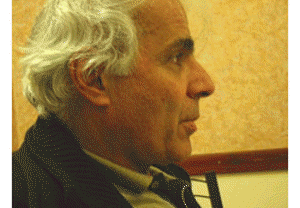
Duaibis Abboud Ashkar (Orpheus)
© Lukas Pairon I have been speaking a lot with
Duaibis today and found out that his organisation Orpheus
is going through very hard times lately, related to a
weak financial basis. Except for some programmes which
are being sponsored by private foundations and others by
governmental agencies, the organisation lacks structural
funding to cover its growing potential. It is difficult
for Arab-Israelis to find support for such cultural
initiatives which are not focussing on traditional Arab
music and culture. Arabs must develop Arab music, not any
other form of classical or popular music.
Why this reasoning in the field of music, but not when
one talks about law or mathematics or physics or most
other fields of study ? Duaibis says it is not
acceptable and defends the position that Arabs have the
right to perform whatever music they are interested in
and like, also western classical music from Mozart to
Boulez. He is so right in everything he says and defends.
I also love his approach to music education, keeping away
from formal scholastic learning methods whereby everyone
learns the same tune on a recorder, and opting to create
situations which make young children and adolescents
curious about music and music making. In order to awaken
this curiosity, Duaibis organises concerts, invites
professional musicians as teachers for short work visits
from abroad, gives his pupils chances to experience the
pleasure of performing music in ensemble, etc. Duaibis
Abboud Ashkar is as I am an adept of the philosophy of
enthusiasm.
During this first day of Ictus in
Nazareth, cellist François Deppe was especially active
in this music workshop, while guitarist Tom Pauwels gave
guitar lessons with a group of kids from the El Mutran
school. Both were completely absorbed in this work from
the moment of their arrival in Nazareth from Tel Aviv
this morning until late in the evening.
The four young teachers from the Université de Lille
also immediately found a place in this lively surrounding
and were asked to participate actively in the workshop as
well. It must have been a dreamed of occasion for them to
get introduced to all these players in the field of music
education of the region, as well as with the type of
students and their potentials.
Pol and I came with the Music Fund truck
to the place where the music workshop was being held and
took two hours of everybody’s time to have a look at
our ’music instruments shop’ : we unloaded
the instruments and composed packages for the different
music projects participating in this Nazareth workshop
(Orpheus, Barenboim-Said Foundation and Al Kamandjati).
It allowed the teachers of the different projects to
check the instruments one by one and make choices fitting
the students needing specific instruments. This
intervention also gave us the pleasure to see some of the
donated instruments immediately being adopted by some of
the students, such as the viola and cello which were
donated to Orpheus in Nazareth.
In the afternoon, the Music Fund convoy
left Nazareth for a few hours to pay a visit to the
kibbutz of Mizra nearby. Ictus has been teaching shortly
at the music centre of this kibbutz during the first year
of its programme in the region and we have met with our
partner in Nazareth thanks to Uri Ben-David from Mizra.
We wanted to show him the truck and the instruments so
that he could visualise the impact of the initiative.
They gave us a few welcome-concerts by groups of mixed
students from the Arab and Jewish communities of the
Mizra area, as a gesture to congratulate us on the succes
of our project. Very kind indeed.
Pol and I retired not too
late to our respective homes and rooms, so that we could
get up in time to leave Nazareth tomorrow morning,
leaving the musicians of Ictus and the young teachers
from Lille behind in Nazareth, and hurry to our next
destination : Ramallah.
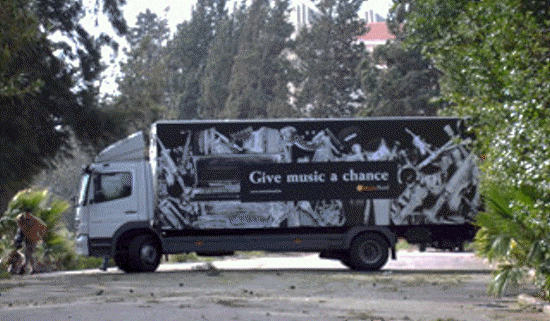
Music Fund truck in Nazareth
© Pol De Winter
Comment:"Know" is a tricky word : when
the young Israeli musicians, for example, went to
Ramallah, they were astounded to see things they
didn’t "know", because nobody showed
them : that Ramallah is very like Jerusalem in its
topography and architecture, that "The armed
ones" who are constantly being shot at by the
Israeli army are not dangerous or murderous but gentle
merry young boys, who guarded them with Kalachnikows and
played Shesh besh with them and spoke Hebrew with them
because they learnt it in Israeli prisons ; that the
people in that city are - how unbelievable - just like
them ; that they are admired and not hated, and that
their visit is admired and not sneered at. They kept
telling me this : we never see These things on
Israeli TV.
Indeed TV shows Palestinians, but as enemies, or as poor,
depraved, almost savage people ; and not as what
they really are to us : brothers who share the same
land. So we "know" about them as such, and we
do not know them for what they are : equal human
beings.
Maybe it is indeed a matter of offer & demand - not
showing because nobody’s interested ; but maybe
it’s "chicken & egg" : not
interested because it isn’t shown.
NBZ, Tel Aviv
Wafin.be: Une présentation de l'ensemble Ictus et de son directeur ...
Lukas Pairon : Je suis directeur de l'ensemble Ictus, composé de 20 solistes spécialisés dans la musique classique dite contemporaine. La plus part des compositeurs que nous jouons vivent encore, nous collaborons même avec eux et les recevons parmi nous.
Wafin.be: Parlez-nous de la genèse de votre projet en Palestine …
Lukas Pairon : Tout a commencé lorsque j'ai reçu une invitation il y a trois ans pour un voyage vers la Palestine. Le but était de développer d'éventuels contacts avec des artistes palestiniens. En juillet 2002, je me suis donc rendu sur place pour 7 jours durant lesquelles j'ai visité les villes de Nazareth, Jérusalem et Ramallah. Le concept a vu le jour en octobre 2002 ; à partir de là nous avons tout de suite mis sur pied les workshops(ateliers) et les masterclasses à l'aide de musiciens de l'ensemble Ictus envoyés sur place. Cette opération s'est depuis renouvelée une dizaine de fois.
Wafin.be: S'agissait-il d'un concept qui visait le long terme ?
Lukas Pairon : Nous souhaitions dès le départ que ces actions s'inscrivent dans la durée! C'est la raison pour laquelle j'ai insisté pour instaurer un travail de partenariat avec certaines écoles. Nous avons d'ailleurs choisi de mettre sur pied un projet pédagogique qui consiste à donner des cours dans un nombre limité d'écoles avec lesquelles nous développons des relations de travail privilégiées. Après un certain temps, cela nous permet d'apprendre à connaître suffisamment les communautés avec lesquelles nous travaillons, même si nous nous y rendons que de temps en temps.
Wafin.be: Avec qui vous travaillez sur place ?
Lukas Pairon : Dans les territoires, nous collaborons avec la Edward Saïd National Conservatory. Un établissement assez bien organisé subdivisé en trois antennes dont une à Bethléem, Jérusalem et Ramallah. Jusqu'ici, nous avons surtout travaillé avec l'antenne située à Ramallah !
Wafin.be: Pourquoi ? Par facilité d'accès ?
Lukas Pairon : (Rires) Non! Parce que beaucoup de bons élèves se trouvent à Ramallah … Ce que nous effectuons est un véritable travail de soutien. Nous entreprenons des incursions et apportons avec nous des partitions de musique contemporaine. Nous essayons également d'ouvrir une fenêtre sur des réalités que ces personnes ne connaissent pas. Ce qui constitue une expérience motivante pour les élèves.
Wafin.be: Quelle est la durée de vos séjours ?
Lukas Pairon : La plus part du temps, nous n'y séjournons pas plus d'une semaine. Sur les cinq jours, nous restons toujours trois jours à Ramallah. Ensuite, nous faisons escale à Tel Aviv où nous travaillons depuis décembre 2003 à l'université avec les étudiants surtout sur des compositions. Cette année, nous nous sommes concentrés sur l'antenne du Conservatoire de Ramallah puis nous avons consacré une journée à l'antenne de Nazareth où l'on trouve une excellente école dirigée par le Père Emile Shoufani.
TONITE JULY 1ST
"Words are useless and politics in meltdown."
Gilad Atzmon's New Quartet at
the Vortex Jazz Club, July 1st
Gilad Atzmon
(saxophones), Frank Harrison (electric piano and
electronics), Yaron Stavi (double bass) and Winston
Clifford (drums).
Unveiling Gilad's latest quartet - expect hard hitting,
edgy, urban electro-acoustic jazz. A return to raucous
high octane blowing by one of the tightest outfits this
side of the Atlantic.
From a previous gig of this Quartet John Fordham of the
Guardian wrote:
The band frequently worked themselves up to thrashing, Coltrane-quartet climaxes, with Atzmon making the connection explicit in quotes from Afro-Blue and A Love Supreme. Flying double-time sax solos over driving jazz swing or intense ballads joined Atzmon's Charlie Parker allegiances to the microtonal pitching and woody sound of Middle Eastern reed instruments. In the second half, the world music and the funky connections became stronger, with bassist Yaron Stavi opening with a bowed drone for Atzmon's swooping soprano-sax sounds; followed by an infectious bass hook underpinning clarinet ascents reminiscent of the Rhapsody in Blue overture; and a polemic on the Iraq war that combined Middle Eastern dance-grooves with Coltranesque free-jazz. Atzmon looks to be on to another winner, with or without computer assistance.